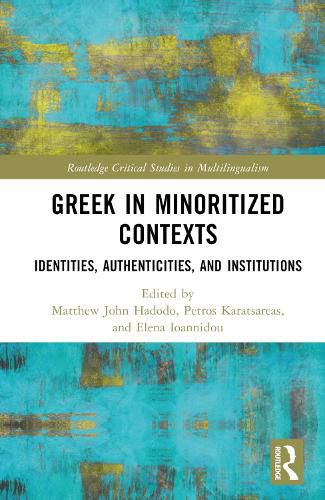Readings Newsletter
Become a Readings Member to make your shopping experience even easier.
Sign in or sign up for free!
You’re not far away from qualifying for FREE standard shipping within Australia
You’ve qualified for FREE standard shipping within Australia
The cart is loading…






This volume examines constructions of Greekness and Greek-speakerhood in geographical and sociohistorical contexts where Greek speakers are minoritised, and Greek is not hegemonic.
Authors explore the sociolinguistic outcomes that arise from minoritisation, distant and more recent history, migration, and the proliferation of digital technologies for communication in the 21st century. Set against the backdrops of Albania, Australia, Canada, Cyprus, Sweden, Turkey, and the UK, the volume chapters consider the manifestations, conceptualisations, and negotiations of linguistic authenticity; the construction of identities; and the impact of institutions such as Greek language schools as well as families on local sociolinguistic landscapes and dynamics. Particular attention is given to the confrontations between competing language forms, practices, and repertoires resulting from the contact between standardised and non-standardised varieties of Greek as well as to communities that are distant from the influence of institutions where Standard Greek or other local Greek norms prevail.
The book is of interest to academic specialists and graduate students in sociolinguistics, applied linguistics, bi-/multilingualism, diaspora studies, linguistic anthropology, linguistic ethnography, social interaction, language contact, and language and culture - with a special focus on Greek.
$9.00 standard shipping within Australia
FREE standard shipping within Australia for orders over $100.00
Express & International shipping calculated at checkout
This volume examines constructions of Greekness and Greek-speakerhood in geographical and sociohistorical contexts where Greek speakers are minoritised, and Greek is not hegemonic.
Authors explore the sociolinguistic outcomes that arise from minoritisation, distant and more recent history, migration, and the proliferation of digital technologies for communication in the 21st century. Set against the backdrops of Albania, Australia, Canada, Cyprus, Sweden, Turkey, and the UK, the volume chapters consider the manifestations, conceptualisations, and negotiations of linguistic authenticity; the construction of identities; and the impact of institutions such as Greek language schools as well as families on local sociolinguistic landscapes and dynamics. Particular attention is given to the confrontations between competing language forms, practices, and repertoires resulting from the contact between standardised and non-standardised varieties of Greek as well as to communities that are distant from the influence of institutions where Standard Greek or other local Greek norms prevail.
The book is of interest to academic specialists and graduate students in sociolinguistics, applied linguistics, bi-/multilingualism, diaspora studies, linguistic anthropology, linguistic ethnography, social interaction, language contact, and language and culture - with a special focus on Greek.